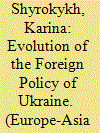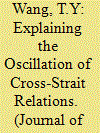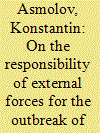| Srl | Item |
| 1 |
ID:
160958


|
|
|
|
|
| Summary/Abstract |
By focusing on the role of, and interplay between, external actors and domestic factors, the present essay explores the evolution of Ukraine’s foreign policy. It argues that this policy has been shaped to a significant degree by positive and negative externalities, being a response to domestic developments as well as external challenges and opportunities. Acknowledging the importance of cost–benefit calculations by domestic actors, the essay does furthermore explore the role of norms and values in forming Ukraine’s foreign policy preferences.
|
|
|
|
|
|
|
|
|
|
|
|
|
|
|
|
| 2 |
ID:
173977


|
|
|
|
|
| Summary/Abstract |
This special section includes four papers to examine the ups and downs of the relationship between Taiwan and China. While both sides of the Taiwan Strait have different political systems, these studies show that domestic politics play a central role in explaining the oscillation of the cross-Strait relationship. The findings provide evidence of the interaction between domestic and external factors. Leaders in Beijing and Taipei therefore need to take heed of the internal forces of both sides of the Taiwan Strait in addressing their contentious relationship.
|
|
|
|
|
|
|
|
|
|
|
|
|
|
|
|
| 3 |
ID:
140268


|
|
|
|
|
| Summary/Abstract |
The idea of non-alignment has remained a central component of Indian identity in global politics that is manifest in continuities: since independence in 1947 India has been in pursuit of strategic autonomy, a quest that in practice has led to semi-alliances fashioned under the cover of non-alignment and shaped by regional dynamics. In this setting, the rise of China now raises an interesting conundrum for Indian policy-makers as New Delhi seeks to balance the benefits and risks of an increasingly assertive neighbour and a network of alliances with like-minded countries. This article approaches this enigma by delineating continuities of non-alignment from the early roots of the policy, through the Cold War-era and into the modern-day international system. Though domestic factors have had a significant influence on the trajectory of Indian foreign policy, the continuities of non-alignment have prevailed through changes in leadership and domestic vicissitudes. By exploring the foundation of non-alignment and how India has operationalized the policy, this article maintains that to some extent continuity will persist: India will likely continue its rhetoric in favour of strategic autonomy while moving closer to the West and its allies in practice. Yet in order to effectively balance China's growing influence, India will need to be more assertive in building these alliances, as the success of its modern-day pursuit of strategic autonomy may well rest on a strong foundation of strategic partnerships. The coming to office in May 2014 of the National Democratic Alliance government led by Narendra Modi has signalled a move away from even the rhetoric of non-alignment, with significant implications for the future of Indian foreign policy.
|
|
|
|
|
|
|
|
|
|
|
|
|
|
|
|
| 4 |
ID:
099582


|
|
|
|
|
| Publication |
2010.
|
| Summary/Abstract |
The author attempts to determine who actually bears responsibility for the outbreak of the Korean War. He compares and contrasts different ideas on this topic and the propaganda clichés used in them. The author himself views the Korean War as a civil war, provoked by the division of the country and exacerbated by foreign interference. While stressing the importance of internal factors in determining the reasons for the war, he notes the special role of Pak Hong-Yong as one of the main supporters of launching this military conflict.
|
|
|
|
|
|
|
|
|
|
|
|
|
|
|
|